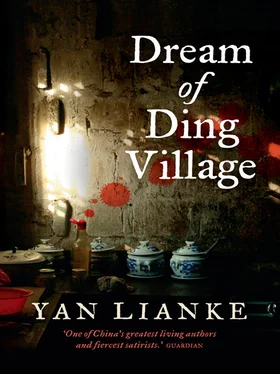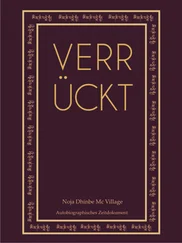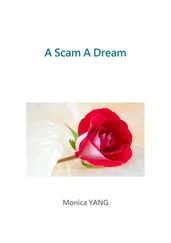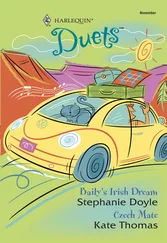My father was a very welcome visitor, drawing queues of people everywhere he went. One day he was ‘serving the people’ in Old Riverton, the next he was doing his bit for the sick in Ming Village, a settlement on the east bank of the old Yellow River path, five or six miles from Ding Village. Ming Village had been hit hard by the fever, and its residents needed coffins as badly as they had needed grain during the famine years. After setting out from Ding Village early that morning, my father had made a stop in the county capital to turn in the forms he’d collected the day before, and had picked up two trucks carrying a consignment of eighty black coffins. Now he was on his way to Ming Village to sell them.
When the villagers saw the trucks rumbling up the road beside the old river path and coming to a stop at the gates of the village, they rushed in from the fields to greet them. The whole of Ming Village gleamed beneath a golden sun. Rays of sunlight shone on the tiled rooftops of the neighbourhood’s two-storey houses bought with blood. Light cascaded through glass doors and windows, and glinted from facades of spotless white porcelain tiles, making the village seem warm and bright. The large trucks, each with a cargo of forty black coffins, were parked outside the gates like two black mountain ranges. The overpowering stench of fresh black lacquer mingled with other odours: the soft perfume of wood shavings, sticky yellow glue and the metallic traces of coffin nails. The motley smell drifted into the fields, masking the scent of spring, and wafted through the lanes and alleyways, giving them a dark, funereal air.
No longer did my father have to do all the work himself. He had a crew of young men to unload coffins from the trucks and help villagers fill out their paperwork, while he sat at a separate table, sipping water and calling up the villagers one by one to collect their completed forms and payments. After he had counted the cash and stuffed it in his black leather case, he would issue a receipt and direct the person to the trucks to collect his or her coffin.
Ming Village was wealthier than Ding Village — at least as wealthy as Cottonwood, the model blood-selling village my father and the others had toured so many years ago. But it had a higher incidence of the fever, and many more people had taken ill than in Ding Village. There was hardly a family untouched by the fever, and households with several sick family members were commonplace. Because Ming Village was a model blood-selling village that had grown rich during the boom, the villagers no longer wrapped their dead in straw mats or buried them in simple graves outside the gates. Black coffins were the fashion. But, after so many deaths, wood for coffins was in short supply. The villagers had chopped down all the usable trees in and around the village. Even the trees along the main road and in nearby villages had been lopped, leaving the landscape bare.
Then my father arrived with his cargo of coffins, like a shipment of coal before a big snowstorm. A timely visitor in their hour of need.
The villagers rushed in from their fields and queued up at the village gate, eager for a chance to buy a discounted coffin. The enormous line of people stretched 200 yards down the lane. To prevent any family from buying more coffins than they were entitled to, my father enlisted the help of the village mayor.
‘Mr Mayor,’ my father said, ‘I wonder if you’d help me vet these application forms.’
The mayor thought it over. ‘I don’t know . . if I don’t tend to my family’s land soon, our crops are going to die.’
‘Does anyone in your family have the fever?’ my father asked.
‘No. None of us sold blood.’
‘Do you have any elderly family members?’
‘My father’s eighty-four.’
‘How about I sell you a coffin now, so you’ll have it ready for him, just in case?’
After a long pause, the mayor asked: ‘Can you give me a discount?’
My father did a quick calculation. ‘I’ll give it to you for one-fifty. That’s fifty below cost.’
‘Will you make sure it’s a good one?’
‘I’ve got three Grade-A coffins. You can take your pick.’
And so the mayor, official village seal in hand, agreed to help my dad vet the applicants. The first thing he did was to scan the queue for villagers who had no sick family members, and yank them out of line. Then he sat down next to my dad and looked through the pile of forms, weeding out applicants who had claimed their fever was full-blown when in fact it was only mild. When this was done, he got down to the business of selling coffins.
By midday, the villagers had made their purchases and were carrying home their coffins. The streets of Ming Village were thronged with people carrying shiny black caskets, singing the praises of the local task force on HIV and AIDS and talking about how lucky they were that the government had been so good to them. Upon reaching home, some of the villagers discovered that they didn’t have room for a coffin, so they simply left them sitting in the middle of the courtyard or leaned them next to their doors, right on the street. Everywhere you looked there were shiny black caskets. Ming Village was a sea of coffins. The villagers were so thrilled by their cut-rate caskets that they forgot all about the fever, forgot all about their sick relatives lying on their deathbeds. Many walked around with cheerful, carefree smiles, while some shed actual tears of joy. Other families, whose sick relatives were not yet sick enough to merit a coffin, had managed to worm their way around the rules and purchase a casket anyway. Unable to flaunt their good fortune, they locked their casket inside the house where no one could see it, then stood outside exchanging pleasantries about the fine spring weather with passers-by.
The next day, my dad made a trip to Old Riverton, not far from Ming Village. This time, he brought three trucks filled with coffins. He instructed the drivers to stop the vehicles in a deserted area about a mile away, so that he could walk into the village alone and reconnoitre. As he strolled through Old Riverton, my dad noted the cement roads and multi-storey tiled houses, all built within the last decade. He could tell that the village was wealthy, and that the villagers must have sold a lot of blood back in the day. He knew they would now be suffering badly from the fever, but he also knew that most of them would have saved up enough money to afford a coffin. Having established these facts, my dad found his way to the home of the village party secretary, introduced himself as the vice-chairman of the county task force on HIV and AIDS, and produced a letter of introduction from the county government. As soon as the party secretary, a flustered young man, read the letter, he invited my dad to sit down for a glass of tea. After asking a few standard questions about the extent of the fever, village mortality rates, etc., my dad decided that it was time to test the waters.
‘So, does anyone in your family have the fever?’ he asked casually, sipping his tea.
The young party secretary lowered his head, tears streaming down his cheeks.
‘How many?’ My dad was all sympathy.
‘My older brother died, my younger brother’s bedridden, and now it seems like I’ve got it, too.’
Silently, Dad handed the young man a handkerchief so he could wipe away his tears. After a moment, he said resolutely: ‘Mr Secretary, I probably shouldn’t do this, but I’m going to make an executive decision: I’m sending our next shipment of coffins right here to Old Riverton, to take care of our sick folks here. But I’ll need your help to keep an eye on things . . we don’t want people who aren’t sick buying up all the cheap coffins and leaving none for the people who really need them, right? And because the government is selling them at cost, there won’t be enough to go around. At market prices, one of these coffins will set you back at least 500 yuan, as I’m sure you know. But since it’s up to me, no one in Old Riverton will pay a penny more than 200.’
Читать дальше












